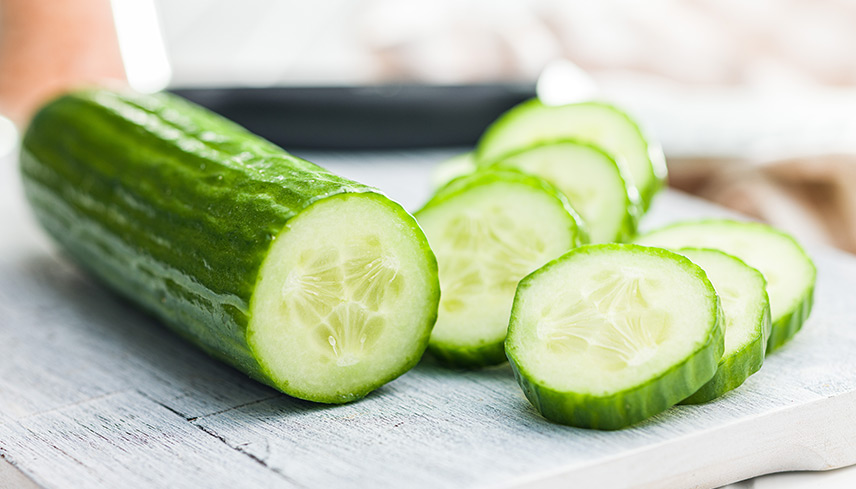Cucumber Chronicles

31 Jul 2024
Exploring the Benefits of Cucumbers
As the days grow warmer, it's the perfect time to enjoy a refreshing summer treat: the crunchy, cool cucumber! Whether sliced in salads, infused in water, or enjoyed as a snack, cucumbers offer a delightful way to stay hydrated and refreshed during the summer months. Let’s delve into some interesting facts about cucumbers so that you know exactly the history and benefits that cucumbers offer.
Cucumbers (Cucumis sativus) are commonly mistaken for a vegetable, when in fact they belong to the same family as watermelons and squashes – the Cucurbitaceae family, a family of fruits characterized by the presence of seeds. (1)
Did you know that the origin of the cucumber can be traced back to various parts of Southeast Asia, where the cucumber has been cultivated for 3,000 years? (2) Since then, the popularity of cucumbers has soared with records of cultivation appearing in Europe by the 9th century and later in North America around the 16th century. (3) Today, cucumbers are an important component of many cuisines, featuring prominently in salads, pickles, and raw dishes. In fact, 95 million tons of cucumbers and gherkins are produced annually, with China accounting for approximately 80% of the global supply. (4) There are 2 main types of cucumbers: Slicing cucumbers are produced ready for consumption and are typically large with thick skins, while pickling cucumbers are smaller with thin skins, optimal for marinading and conserving. (5)
So, what are the health benefits of consuming cucumbers? First, cucumbers are a well-known hydration hero, consisting of 90 to 95% water. (2) This makes them an excellent snack during hot summer days, replenishing lost fluids and maintaining optimal hydration levels. Additionally, the high water content of cucumbers contributes to feeling full, making them potential allies in weight management. This pairs well with the fact that cucumbers are fat-free, sodium-free, and a low source of calories. In fact, there are only 16.8 calories per 140-gram serving of peeled raw cucumber. Cucumbers are also a source of vitamin K, an important factor in blood clot formation as well as calcium absorption and bone maintenance. (2,5) Just 140 grams of peeled, raw cucumber accounts for 8% of the recommended daily intake of vitamin K. With the peel intact, that value skyrockets to 19%; something to consider next time you’re thinking about removing that shiny, glorious, nutritious peel! Aside from vitamin K, cucumbers also contain calcium and pantothenic acid, two metabolic regulators. Also, diets rich in fruits and vegetables may play a role in reducing the risks of heart disease and cancer. (6, 7)
Here are additional cool facts about this intriguing fruit (8, 9):
- Boiling cucumbers releases chemicals that have a calming sensation.
- Placing sliced cucumber on your tongue can eliminate bad breath.
- The waxy cucumber coating may act as an eraser on some surfaces.
- The cooling properties of cucumbers can soothe and hydrate skin.
Let’s embrace the versatility and vitality of this humble yet extraordinary fruit. Whether you’re whipping up a fresh salad, crunching down on some pickles, or simply enjoying some fresh cucumbers on a hot summer day, take a moment to appreciate this remarkable fruit – from its ancient origins to its enduring presence on our plates and beyond!
If you have questions about this topic or a related subject, feel free to contact us at food.assuris@intertek.com or visit us online at https://www.intertek.com/assuris/food/.
References
- Britannica, T. Editors of Encyclopaedia (2024, May 4). cucumber. Encyclopedia Britannica. https://www.britannica.com/plant/cucumber Mallick, Pushpa. (2022).
- Evaluating Potential Importance of Cucumber (Cucumis sativus L. -Cucurbitaceae): A Brief Review. International Journal of Applied Sciences and Biotechnology. 10. 12-15. 10.3126/ijasbt.v10i1.44152.
- Doucet, Roger A. and Bourlaye Fofana. "Cucumber". The Canadian Encyclopedia, 22 March 2015, Historica Canada. thecanadianencyclopedia.ca/en/article/cucumber.
- 2019 Production of cucumbers and gherkins; from pick lists: World regions/Production Quantity". FAOSTAT of the United Nations. 2019
- Health Benefits of cucumber (https://www.medicalnewstoday.com/articles/283006)
- https://www.canada.ca/en/health-canada/services/publications/food-nutrition/summary-health-canada-assessment-health-claim-about-vegetables-fruit-heart-disease.html
- Authorized Health Claims That Meet the Significant Scientific Agreement (SSA) Standard | FDA
- Chakraborty, Shampa & Rayalu, Sadhana. (2021). Health Beneficial Effects of Cucumber. 10.5772/intechopen.96053.
- https://www.nationaldaycalendar.com/national-day/national-cucumber-day-june-14#:~:text=NATIONAL%20CUCUMBER%20DAY%20%7C%20June%2014%20%2D%20National%20Day%20Calendar
